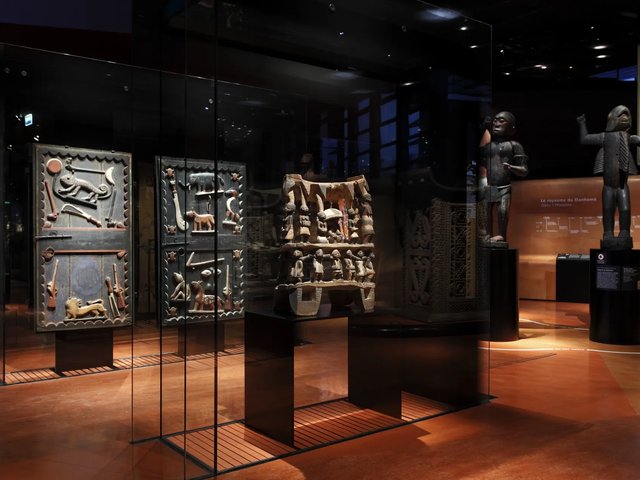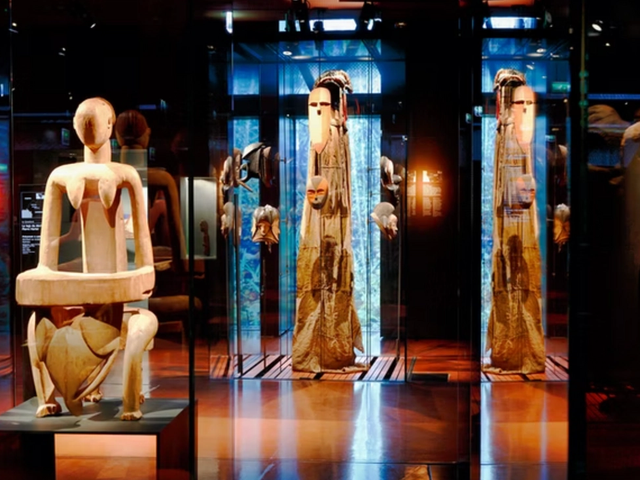Eight years after French president Emmanuel Macron pledged to return African heritage to the continent, his government has adopted a bill facilitating the deaccession of cultural items plundered from former colonies.
The bill, presented on Wednesday 30 July to the cabinet by the culture minister Rachida Dati, reaffirms the principle that French public collections are “inalienable” but provides an exemption for items taken by force from the colonies.
The proposed rules are complicated. For an item to be considered for deaccessioning, a request has to come from a foreign state. It will only be accepted if the work is destined to be “preserved and exhibited to the public”. The request would have to concern items which were allegedly stolen, looted, sold under duress or given by someone who did not have the authority to do so. The case would then be examined by a bilateral scientific committee; if approved, the Conseil d’Etat—France’s most senior administrative jurisdiction—will be able to announce the object’s restitution.
According to the bill, the rules would apply to the period between the Vienna Congress of June 1815, which reshaped Europe in the wake of Napoleon’s fall, and April 1972, the date that the Unesco convention for the protection of cultural heritage was introduced. All cases relating to objects stolen after 1972 would have to be heard in a civil court .
This would be the case for two statues stolen from temples in Nepal, which were acquired by the Guimet Museum, and seven looted objects in the Louvre that have been requested by Italy, according to comments from the ministry on the bill.
In its comments, the culture ministry rejected the idea of placing “general suspicion” on all collections formed during the years of the French empire. Military items, public archives as well as the shares of archeological digs are excluded from the proposed legislation.
What are the next steps?
Up to now, France has had to adopt a specific law each time it consents to a restitution, a painstaking process which takes years. As a result, since Macron’s pledge in 2017, France has returned only 30 objects to a handful of African countries. Parliament recently approved a call to send a “talking-drum” back to the Ivory Coast
The Conseil d’Etat has yet to screen the bill but Dati intends to push forward. The senate expected is to publish its report on 11 September, then the text will be submitted for a vote in the senate on 24 September.
A rocky road ahead
While two laws for the restitution of Nazi-looted art and human remains were unanimously adopted by the French parliament in 2023, the subject of France’s imperial past remains highly sensitive. With this new bill, the government and parliament will need to work hard to justify an exception to the general law—providing an “imperative cause for exemption”—and with the rise of far-right figures in their ranks, a moral condemnation of the French empire is out of the question.
The case of donations and legacies will also be tricky, as they are normally strictly protected against deaccessioning. A large number of African and Oceanic artefacts were donated by missionaries, officers and administrative staff on their return home or by their heirs.
The senator Pierre Ouzoulias, a prominent member of France’s cultural commission, told The Art Newspaper that he “deeply regrets” the government’s attempt to precipitate “such a complex matter, after years of delay when Dati did nothing to move forward with the bill”. Against the opinion of the government, he is demanding oversight by a “permanent scientific council, formed of scholars, lawyers, representatives of state bodies”, whose views would be made public. He believes this would stop restitutions allegedly being made to serve “diplomatic” interests, an issue also raised to The Art Newspaper last year.
Requests for restitutions are pending from Algeria (personal effects of the rebel leader Abdel Kader), Benin (most notably a statue of the Vodun god Gou), Ivory Coast (around 150 objects), Madagascar, and Mali (objects taken by the 1931 Dakar-Djibouti ethnographic expedition). Mali is also requesting, along with Senegal, the return of the so-called “hoard of Ségou”: gold and jewels from the Toucouleur kingdom which were unearthed by French troops in 1890. Ethiopia and Chad, meanwhile, forwarded a general request in 2019 with no list attached.






